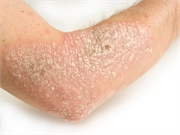Prevalence of thyroid dysfunction high with generalized pustular, erythrodermic psoriasis
FRIDAY, July 31, 2020 (HealthDay News) — Thyroid dysfunction in patients with psoriasis may be associated with inflammation caused by psoriasis, according to a study published online June 22 in the Journal of Dermatology.
Jianfeng Zheng, from the Tongji University School of Medicine in Shanghai, and colleagues evaluated the prevalence of thyroid dysfunction in patients with psoriasis vulgaris (PsV), psoriatic arthritis (PsA), generalized pustular psoriasis (GPP), and erythrodermic psoriasis (EP) and the association of thyroid dysfunction with inflammation among 201 psoriatic patients visiting Shanghai Skin Disease Hospital from January 2014 to November 2017 (159 men and 42 women; 74 PsV, 42 PsA, 38 GPP, and 47 EP).
The researchers found that 33 percent of psoriatic patients had thyroid dysfunction. Among EP patients, the percentage with thyroid dysfunction was the highest (60 percent EP, 42 percent GPP, 19 percent PsA, and 19 percent PsV). There was a significant decrease noted in the prevalence of thyroid dysfunction when patients switched from EP to PsV or PsA (58 versus 17 percent; median, 20.5 months). Most of the patients with thyroid dysfunction had low thyroxine syndrome (low serum levels of free thyroxine but normal serum thyroid-stimulating hormone level). Compared with those without thyroid dysfunction, patients with thyroid dysfunction demonstrated significantly higher CD3⁺ and CD4⁺ T-cell absolute count levels but lower immunoglobulin (Ig)A and IgM levels. While not statistically significant, patients with thyroid dysfunction demonstrated higher elevated serum C-reactive protein levels versus those without dysfunction in total.
“There may be some confounding factors between psoriasis and thyroid dysfunction, aside from inflammation,” the authors write.
Copyright © 2020 HealthDay. All rights reserved.








